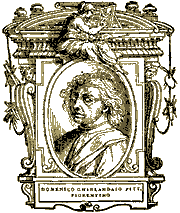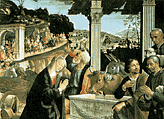Painter
Domenico Bigordi, Florence 1449-1494
He owned an extremely busy workshop with his two brothers and his son Ridolfo
(Florence 1483-1561) and introduced a local form of Flemish realism. He
developed his painting according to the techniques of Masaccio,
the style of Filippo Lippi and the northern realism he had discovered in
the work of Hugo van der Goes, creating harmonious and aesthetically beautiful
scenes which - apart from the actual subjects - are precious documents on
the everyday life of the time.
His first important frescoes are in the Chapel of Santa Fina at San Gimignano
(1475) and a Madonna of Mercy in the Church of Ognissanti in Florence. He also
painted a Last Supper in the refectory of the monastery of Ognissanti.

Last Supper -
Refectory of Ognissanti
Sometime after 1480 he was called to Rome to decorate the Sistine Chapel
and later, in 1482, decorated the Sala dei Gigli in Palazzo
Vecchio.
A born storyteller, some typical examples of his art are the frescoes describing
the Life of St. Francis in Santa Trinita where, using the religious story as
an excuse, he portrayed contemporary personalities in the fashionable clothes
of the time. He frescoed the Choir of Santa Maria
Novella, his most famous work, between 1486 to 1490;
here his brilliant handling of perspective almost becomes an end
unto itself.


